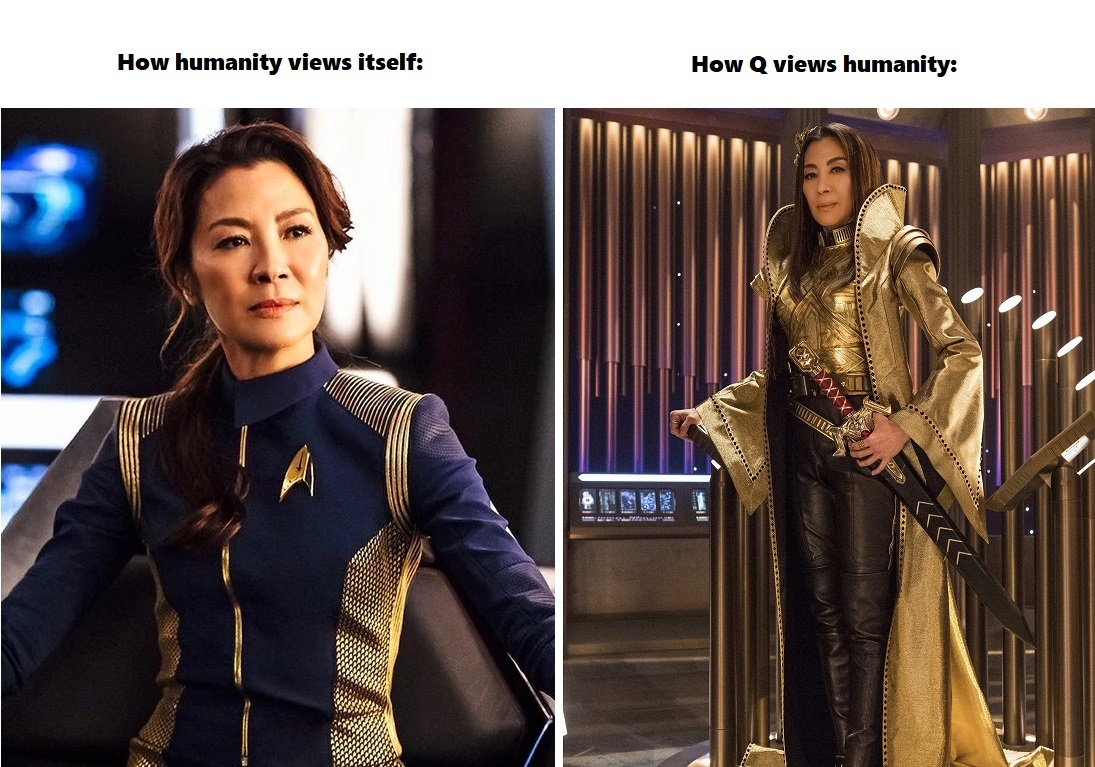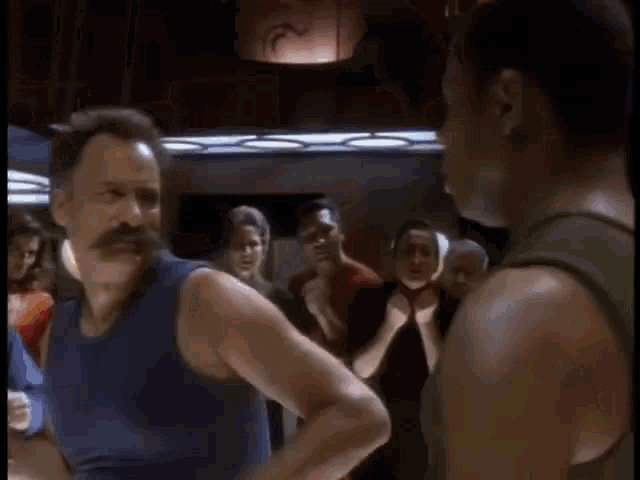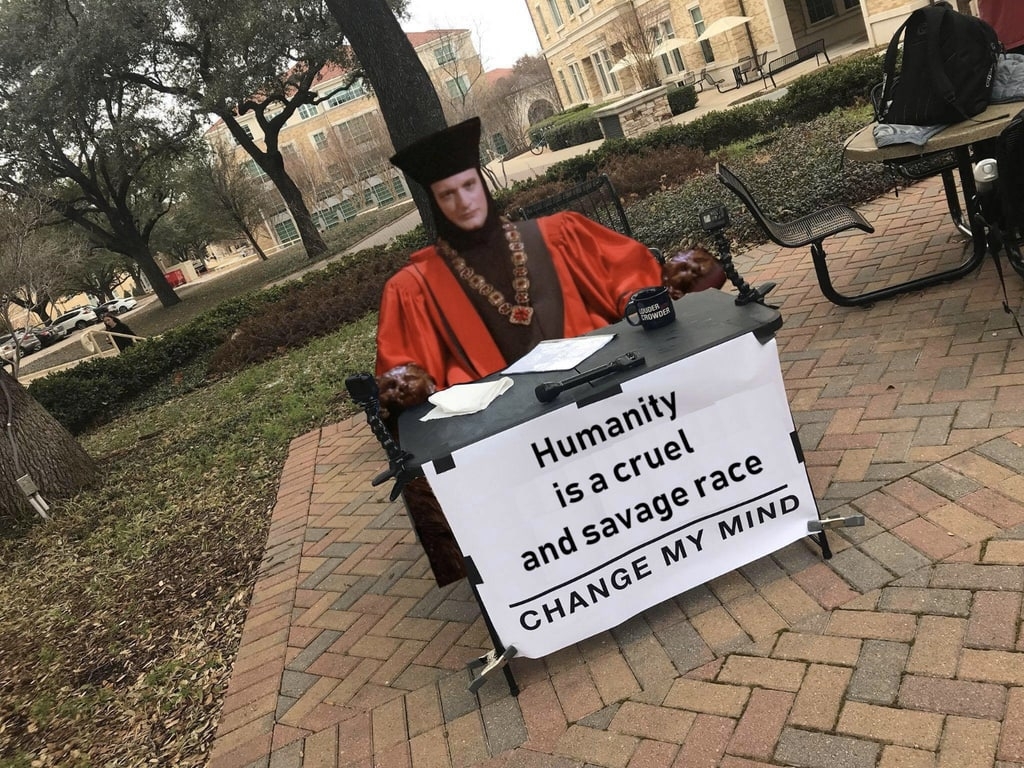
Risa
Star Trek memes and shitposts
Come on'n get your jamaharon on! There are no real rules—just don't break the weather control network.
Well shit, both look badass.
How humanity really is: ^
I like to think, we're like a middle thing. A little bit from Philippa A, a little bit from Philippa B
Why are you booing Q?
He's right.
I think a big part of the reason this was a theme in TNG was because it was supposed to get people in the '90's to reflect on whether the USA was actually the hero of the story that our history, politicians, and media tells us we are, or whether the idea that we're "more civilized" than other countries was a lie we spoon-fed ourselves.
I mean, it's an idea that sat with me most of my whole life. We are not the heroes of our stories, and a lot of the stories we tell ourselves are kind of a self-deception propaganda to justify why we have a higher quality of life at the expense of the rest of the world.
USA was at the time a country that promoted itself as one of the least violent and most civilized nations in the world. The US government was hiding behind "We don't cut criminals heads and hands off" as though we don't use psychological torture much more often on our own populace.
They can't really hide behind "our police aren't violent" so much anymore, because it was clearly always a lie.
I like what you're saying, but you're overthinking the show a lot. It was just a plot device to show how humans are the best.
Tomato tomahto.
I felt like it was a plot device to show how humans are capable of great things, not that they always are the best. Picard was always supposed to be the philosophical pinnacle we should desire to reach. I mean it's already a post-scarcity society where pursuit of wealth is viewed as a negative. I saw it as that humans and the Federation still had a long way to go, despite their successes, much like the USA in the 90s.
Absolutely. I agree with you 100% You just said that way better than I could.

Y E S, A N D?
I always found it a weird choice to start off with this in season 1 episode 1. What a strange introduction to the Star Trek Next Generation series.
And why didn't Q mess with the Klingons when talking about savage brutes?
They don't pretend not to be cruel and savage.
In fact, they pretend to be cruel and savage even when they're not.
He likes their opera?
You don't know Shakespeare until you heard it in the Klingon original
It's just mythology, third take. So humans are always the main characters of the universe.
Humanity is the middle race between extremes, between some lowly race like demons or dwarves, and some highly race like angels or elves. Tolkien just rephrased it, and so did scifi. Basically all of fiction where there are ~~other humans with weird bodily features~~ other species besides humans is just this trope redone.
And here I am always playing boring human characters in pen and paper role playing games ^^
Well, 99% of the time I'm a GM, but when I get to play, I pick the most generic bland flavour - willingly ^^
Nothing wrong with the classics! I play as a human usually too, sometimes an elf
Tropes are only annoying if done badly, or have become outdated. But the question of humanity will always be something we should ask
Why, it set a more philosophical tone for the series. He's a villain that's completely unbeatable so your only choice is to make him bored so he goes away.
I have no problem with this character or plot lines. I only take issue with it being in the first episode. The series is primarily about exploring new worlds and new civilizations and they managed to encounter the final boss in the first episode. It makes it seem less significant and just a common occurrence. In my opinion we should introduce the characters first under more normal circumstances that actually are common occurrences for them.
https://tvtropes.org/pmwiki/pmwiki.php/Main/OpeningBossBattle
Then there are other games that drop you into a Boss Battle right from the very beginning.
While not always, this boss will more than likely be the game's Big Bad, and usually also the Final Boss. If it can be beaten, either then the boss will be in its weakest form, or the player is in the A Taste of Power segment and soon will be depowered. Otherwise, it will be a Hopeless Boss Fight. If it's not the Big Bad, then it will likely be a Starter Villain.
Starting in medias res is really common, actually. Not just in games, I've seen plenty of media where it opens with a confrontation with the Big Bad who is going to be the Final Boss.
It's an interesting idea, but in my opinion not the best method of storytelling. It's just my personal opinion, but I like to see some slow build up and maybe some allusions to what is coming without giving it away up front. The sense of mystery and suspense is important to me.
Each individual episode of Star Trek TNG is very good at this, but the overarching plot not so much.
I can understand that perspective, especially with an episodic show that lasted many seasons. It had ample opportunity to make some build-up.
However, I would say that also, with all new properties, even spin-offs of old ones, there is inherent risk and worry that there won't be more than one season. Often, you have writers trying to hamfist everything into that first season because they want their story actually resolved, even if it gets canceled. That feeling, on top of the difficulties of getting the series off the ground in season one, including a string of writers quitting because they couldn't get along with Roddenberry, and the cutting of a gay couple meant to be in the series, definitely speaks to the idea that the first season wasn't "in the bag" as it were, and there was risk if they waited, the show could get canceled.
This was also during a period where episodic television where one episode is completely self contained from all the rest was the norm and long branching stories between episodes really hadn't become the norm yet. X-Files would end up pioneering the coupling of a "monster of the week" format along with a larger story woven in.
Anyway, it's easy to speculate from here in the future, where we all revere the series as something amazing we grew up with. It had a troubled start, there were no guarantees, and it's hard to pin down why they chose to do things the way they did, especially with all the early infighting over writing.
I think it showed that the series would require characters to think outside the box. It's not about being smarter or technologically advanced. It's subtle, like real life.
DC Fontana's original Encounter at Farpoint script didn't include the Q storyline at all. That was added by Roddennberry to pad the length.
And TNG features a humanity that has overcome most of our current cruelty and savagery.
Do you think maybe the race of higher dimensional beings that apparently perceives time as a whole might take a longer view of such things?
Nah.
This is an excellent photoshop. It's just missing some upscaling of the Q layer.
Ikr? First thing i noticed, was the quality.
Edit: i mean the good Photoshop quality, like in Q's proportion, the clean cut out & alignment, etc.
Reading my own comment, without the edit, i sound like i mean Q's bad quality, because not upscaled
Just wanted to say that I was going to post this exact meme and last second I had to find another one because I saw your post.
Well done.
Yes. Yes, we are. We had to be to survive, but our lizard brains still think that way even though it now leads us to our destruction.
"I need a lot of people to suffer so I can feel like a bigger winner!"
More like "fuck everyone but me and my tribe!"
I'll water board you
Only 8 TNG episodes feature Q
And they are all excellent.
100%
I don't particularly care for this plot.
Q is omniscient, so he already knew that our history is rife with examples of good people and bad people, brilliant and ignorant... and he comes to judge a fairly utopian future society of a unified, post-capitalism, post-religion Earth? My dude, they're doing fine.
This assumes Q was there to actually judge humanity and not begin a dialogue with Picard and the Federation. In his own omnipotent way. It's not a judgement, it's more of a test or like a training.
This is definitely how I always saw it.
Q isn't arguing in good faith because he wants to see humans "rise above it" as it were. It isn't fair, but it is a quick way to reveal if their most base impulses will take over when under pressure.
Q sees human society in TNG as on the path to becoming better than they already are, but thinks they need some prodding to make it there.
It's almost Nietzchian in a way. He wants humanity to leave the worst aspects of our culture which are holding humanity behind, and that takes effort and self-reflection and consideration. Q is trying to kickstart that self-reflection, consideration, and effort. He knows Picard is a good man and can do it. He definitely has a "thing" for Picard and I think it is close to love. It is why he chooses him.
He wants Picard to no longer simply be a real mensch, but a real ubermensch.
Sisko doesn't realize its a test to make humanity better, and just sees a Nazi arguing in bad faith.
So he punched Q.
It's a question of how these humans justify their image of their own race. I enjoyed it, as all Q episodes it was fun.
It's easy to be a saint in paradise.
Unless the United Federation of Planets is the Warhammer 40K "Dark Age of Technology" and Q saw the rise of the Emperor, chaos and neverending war.
After all TNG took place in the 2370s? The Hours Heresy is in the 30,000s. Plenty of time for humanity to fuck everything up.
He's just poking at us, to make sure it holds under pressure.
